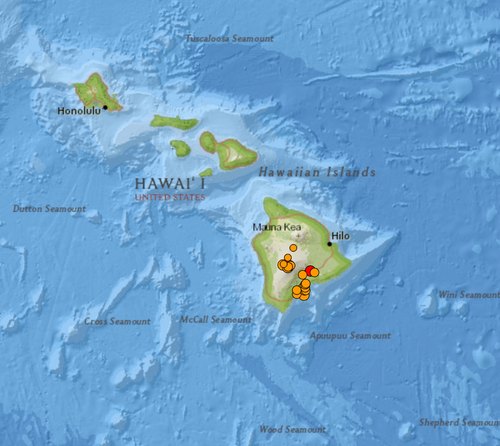
United States Geological Survey data shows earthquake swarms continue around the world's largest active volcano, Mauna Loa, on the Big Island of Hawaii. Such unrest could be a precursor to an eruption not seen in decades.
In the 24 hours ending Tuesday, at least 50 quakes measuring 3.0 magnitude or below rattled Mauna Loa. Geologists are worried the quakes are signs magma churns underneath the volcano could spark an eruption, though there are no signs of anything imminent.
Here's USGS' latest update:
Mauna Loa continues to be in a state of heightened unrest as indicated by increased earthquake activity and inflation of the summit. The current unrest is most likely being driven by renewed input of magma 2–5 miles (3–8 km) beneath Mauna Loa's summit.
During the past 24 hours, HVO [Hawaii Volcano Observatory] detected 50 small-magnitude (below M3.0) earthquakes 2–3 miles (2–5 km) below Mokuʻāweoweo caldera and 4–5 miles (6–8 km) beneath the upper-elevation northwest flank of Mauna Loa. Both of these regions have historically been seismically active during periods of unrest on Mauna Loa.
Seismic unrest is still burbling under Mauna Loa #volcano on Hawai'i island. No eruption is imminent, but taking steps now to prepare gives you more control if the situation changes. @USGSVolcanoes has compiled a good set of preparedness resources here: https://t.co/YMbSNw6q49 pic.twitter.com/aA9E80u0Ly
— Hawaii EMA (@Hawaii_EMA) November 15, 2022
This heightened unrest began in mid-Sept. with increased earthquake rates below the Mauna Loa summit. By October, we reported the volcano was placed on red alert.
"Geologists say they expect to see more persistent and heightened rate of ground deformation and seismicity before a future eruption," Fox Weather noted.
Mauna Loa is about half of the Hawaii Island landmass. So any eruption would immediately impact residents. There are about 200,000 people on the island. It last erupted in 1984, and lava flows took out homes in under two hours.
Swarms of quakes are sometimes the first indications of volcanic reawakening.
United States Geological Survey data shows earthquake swarms continue around the world’s largest active volcano, Mauna Loa, on the Big Island of Hawaii. Such unrest could be a precursor to an eruption not seen in decades.
In the 24 hours ending Tuesday, at least 50 quakes measuring 3.0 magnitude or below rattled Mauna Loa. Geologists are worried the quakes are signs magma churns underneath the volcano could spark an eruption, though there are no signs of anything imminent.
Here’s USGS’ latest update:
Mauna Loa continues to be in a state of heightened unrest as indicated by increased earthquake activity and inflation of the summit. The current unrest is most likely being driven by renewed input of magma 2–5 miles (3–8 km) beneath Mauna Loa’s summit.
During the past 24 hours, HVO [Hawaii Volcano Observatory] detected 50 small-magnitude (below M3.0) earthquakes 2–3 miles (2–5 km) below Mokuʻāweoweo caldera and 4–5 miles (6–8 km) beneath the upper-elevation northwest flank of Mauna Loa. Both of these regions have historically been seismically active during periods of unrest on Mauna Loa.
Seismic unrest is still burbling under Mauna Loa #volcano on Hawai’i island. No eruption is imminent, but taking steps now to prepare gives you more control if the situation changes. @USGSVolcanoes has compiled a good set of preparedness resources here: https://t.co/YMbSNw6q49 pic.twitter.com/aA9E80u0Ly
— Hawaii EMA (@Hawaii_EMA) November 15, 2022
This heightened unrest began in mid-Sept. with increased earthquake rates below the Mauna Loa summit. By October, we reported the volcano was placed on red alert.
“Geologists say they expect to see more persistent and heightened rate of ground deformation and seismicity before a future eruption,” Fox Weather noted.
Mauna Loa is about half of the Hawaii Island landmass. So any eruption would immediately impact residents. There are about 200,000 people on the island. It last erupted in 1984, and lava flows took out homes in under two hours.
Swarms of quakes are sometimes the first indications of volcanic reawakening.






